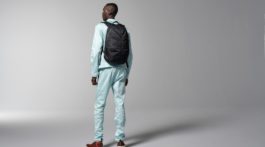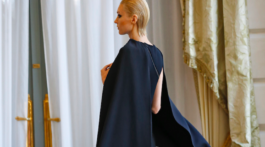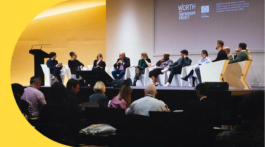January 12, 2015
By Contributor
Image by Geoffrey Lillemon, Work in Progress #2 for Bernhard Willhelm 3000
Los Angeles, USA – From February 7 to May 17, 2015, the Museum of Contemporary Art Los Angeles (MOCA) will present the first American museum exhibition of the work of fashion designers Bernhard Willhelm and Jutta Kraus.
“Bernhard Willhelm 3000: When Fashion Shows The Danger Then Fashion Is The Danger” is a site-specific work at MOCA Pacific Design Center that functions as a sculptural installation and features their Fall / Winter 2015-16 collection. Including video, photography, and displays of ephemera and objects selected by Willhelm, the installation is a meditation on the future of commerce and a “thinking-forward exhibition.” The designer sees the show as his response to the uniformity of consumerism in the 21st century as well as a forecast of the fashion experience in the 22nd century.
Since the founding of his eponymous label in 1999 with Kraus, Willhelm has been moving “in between chaos and diversity.” In opposition to the minimalist designs that dominated runways in the 1990s, Willhelm’s designs are characterized by their outspoken visual language: which they transform and combine in and unparalleled way with juxtapositions between high and low culture. The pair situates their work as a mirror to the Paris court of fashion, and a comment on prevailing views of taste and wearability.
Willhelm cites his upbringing in small town Germany, and the concept of “the freedom of the fool,” as the source of his irreverence. “The clown has always been a very special person to me—he was always the one who was allowed to say the truth to the king. Of course, to find the truth, you need to say hi to your haters and bye to conventions,” he says.
Bernhard Willhelm 3000 follows the relocation of Willhelm and his Paris-based studio team, headed by Kraus, to the Beachwood Canyon section of Los Angeles. Following past collections—which incorporated the loose-fitting, draped garments of the Middle East, India, and Africa into punk-inspired assemblages—their latest designs and tableaux vivant presentations reflect the diversity of the global metropolis. The forthcoming spring-summer collection — which will be unveiled as part of the installation at MOCA — further positions the concept of diversity as a response to climate change and ecological disaster.
Bernhard Willhelm 3000 is an experiment, and through the emotive qualities of the work in the exhibition, it also serves as an opening to a dialogue between art, fashion, and consumerism.
Bernhard Willhelm (b. 1972, Ulm, Germany) and Jutta Kraus (b. 1972) studied fashion at the Royal Academy of Fine Arts in Antwerp and the University of Westminster in London before launching the Bernhard Willhelm label in 1999. Since their first presentation of womens’ wear in Paris, they have brought a highly personal, idiosyncratic style to the arena of fashion, with work typified by craftsmanship, eclecticism, and irony, and seasonal collections presented in the forms of installation and tableaux vivant.
Willhelm’s career has been marked by collaboration with artists such as Björk, Olaf Breuning, Cyril Duval, and Carsten Fock, and awards including the Moët & Chandon Fashion Prize (2001) and ANDAM from the French Minister of Culture (2005). His work has been presented at the Athens Biennale; the Ursula Blickle Foundation, Stuttgart; and in retrospectives at ModeMuseum, Antwerp (2007-08); Groninger Museum, Netherlands (2009-10).
ABOUT THE MUSEUM OF CONTEMPORARY ART, LOS ANGELES (MOCA)
Founded in 1979, MOCA’s vision is to be the defining museum of contemporary art. In a relatively short period of time, MOCA has achieved astonishing growth with three Los Angeles locations of architectural renown; a world-class permanent collection of more than 6,800 objects international in scope and among the finest in the world; hallmark education programs that are widely emulated; award-winning publications that present original scholarship; groundbreaking monographic, touring, and thematic exhibitions of international repute that survey the art of our time; and cutting-edge engagement with modes of new media production. MOCA is a not-for-profit institution that relies on a variety of funding sources for its activities.
www.moca.org







